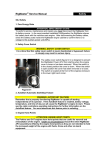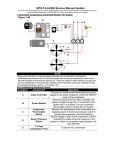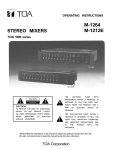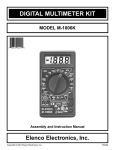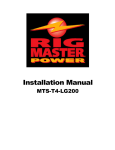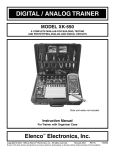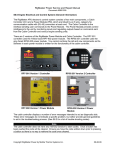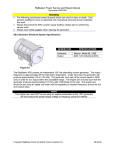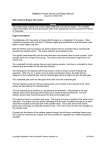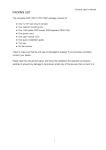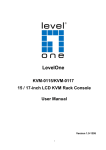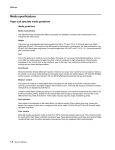Download RigMaster Service Manual-Basic Engine Repair
Transcript
RigMaster Power Service and Repair Manual Document # S5B01009 S5.0 Introduction to Engine Repairs This section of the service manual outlines some basic engine repairs. The Perkins 400 Series Service and Repair Manual or the Caterpillar C0-5 Service and Repair Manual contain more detailed information on these procedures and should be used as the primary reference when performing engine service and repairs. There may be some RigMaster assembly components that need to be removed in order to service the engine as outlined by Perkins and Caterpillar. This section is intended to provide information about how to perform these engine repairs while installed on the RigMaster APU. Please be aware that the engine bolt sizes are all metric, whereas the other assembly components are likely fastened with SAE sized hardware. Be sure not to use impact guns to replace hardware on the engine. Always use a calibrated torque wrench and refer to the appropriate service and repair manual for torque specifications and proper installation methods. NOTE Dealer Certification and technical training is required by the appropriate engine manufacturer in order to perform warranty engine work. Otherwise warranty may be null and/or void by the manufacturer. ONLY AUTHORIZED ENGINE DEALERS MAY DO WARRANTY WORK. Copyright RigMaster Power by Mobile Thermo Systems Inc. 09-28-09 RigMaster Power Service and Repair Manual Document # S5B11009 S5B.1 Fuel Pump NOTE Bleeding of the fuel system must be done prior to starting the engine. See section S5A.2 for proper bleeding procedures. Failure to bleed the fuel system can result in failure to start and/or damage to the injection pump. Removal of the Fuel Pump 1. Shut off the fuel supply at the fuel filter assembly by rotating the fuel valve handle in a counterclockwise direction to the closed position. (3 o’clock position) 2. Remove the fuel supply and discharge lines from the fuel pump. 3. Loosen the two screws that secure the pump to the engine. 4. Gently tap the fuel pump with a rubber mallet to break the seal. 5. Fully remove the mounting screws. 6. Lift the pump away from the engine. 7. Replace the gasket prior to reinstalling the fuel pump. 8. Reinstallation is the reverse of removal. 9. Torque bolts to 5 lb/ft. (6 N-m) Component Fuel Lift Pump Torque Spec. 5 lb ft (6 N m) Copyright RigMaster Power by Mobile Thermo Systems Inc. 09-28-09 RigMaster Power Service and Repair Manual Document # S5B21009 S5B.2 Fuel Injectors Fuel Injector Removal 1. Shut off the fuel supply at the fuel filter assembly by rotating the fuel valve handle in a counterclockwise direction to the closed position. 2. Remove the union nuts from the injectors and pump. 3. Remove the lines from the pump as an assembly. 4. Install suitable plastic plugs into the outlets of the injection pump. 5. Disconnect the union nut from the banjo piece for the flexible return line. 6. Remove the nuts from the injectors 7. Remove the fuel return line from the engine and remove the washers from the fuel injectors. 8. Reinstall components in reverse order. Replace all washers during re-assembly. CAUTION Do not let the tops of the injectors turn when loosening or tightening the union nuts on the injectors. The tips of the injectors will be damaged if the injectors are allowed to turn in the block. CAUTION The engine will be damaged if a defective fuel injector is installed. The spray pattern of the injector may not be correct. Component Fuel Injector Fuel Injector Nuts Union Nuts Torque Spec. 47lb-ft (64 N m) 20 lb-ft (27 N m) 15 lb-ft (20 N m) Copyright RigMaster Power by Mobile Thermo Systems Inc. 09-28-09 RigMaster Power Service and Repair Manual Document # S5B31009 S5B.3 Injection Pump CAUTION Great care must be taken to ensure that contaminants do not enter the engine through the injection pump cavity. Cover the opening when removing the injection pump. Component Fuel Injection Pump Torque Spec. 5 lb ft (6 N m) Removal of the Fuel Injection Pump 1. 2. 3. 4. 5. 6. Remove Fuel Solenoid. (See section 5.3) Remove high pressure fuel lines. (See section 5.2) Remove the two (2) hex head screws and (2) nuts that secure the pump to the engine. Remove the oil leak-off pipe. Carefully lift the injector pump assembly until the governor linkage can be accessed. Remove the cotter pin from the governor linkage, and carefully slide the connecting link off of the injector slide assembly stud. 7. Remove the fuel injection pump and leave the metal shim in place as it will be reused. 8. Reassembly is the reverse of disassembly. 9. Torque bolts and screws to 5 lb/ft. (6N-m) NOTE During reinstallation of the pump ensure that the face of the metal shim is clean so a good seal is created when the pump has been reinstalled. Copyright RigMaster Power by Mobile Thermo Systems Inc. 09-28-09 RigMaster Power Service and Repair Manual Document # S5B41009 S5B.4 Timing Case Cover Component Timing Case Torque Spec. 7 lb ft (6 N m) Remove the Timing Case 1. Disconnect safety cover switch and remove right side panel. 2. Remove fan belt and engine fan. 3. Remove crankshaft pulley. 4. Remove the fuel solenoid and injection pump. 5. Remove the hardware that secures the timing cover case to the engine. 6. With great care, gently tap the timing case with a rubber mallet to break the seal. 7. Remove the timing case cover with the front oil seal. 8. Remove and dispose of joint between cover and block. 9. Inspect the timing cover housing for wear or damage. 10. When replacing the cover use a new gasket and replace the front oil seal. 11. Install the seal guide (Perkins part #21825620) to the crankshaft. 12. Align the locating pin with the locating hole on the oil pump cover and ensure oil pump cover is concentric with oil pump idler gear. 13. Install new joint to the front of the cylinder block. 14. Move the cover into position while guiding the linkage to the fuel injection pump. 15. Fasten front cover with fasteners and torque to 7 lb/ft. (10 N-m) 16. Remove the seal guide from the crankshaft. 17. Reassemble remaining components in reverse order. Copyright RigMaster Power by Mobile Thermo Systems Inc. 09-28-09 RigMaster Power Service and Repair Manual Document # S5B51009 SB5-5 Governor Spring Removal of the Governor Spring 1. 2. 3. 4. 5. Remove the fuel solenoid. Remove the fuel injection lines from the injection pump and injectors. Remove the oil leak-off pipe that is secured to the fuel injection pump set screw. Remove the set screws and nuts from the fuel injection pump. Carefully lift the injection pump from the cylinder block and pull the clip from the governor lever stud.(see figure 5-1) Fuel Injection Pump Removal Govern Lever Govern Lever Stud Cotter Pin Fuel Rack Figure 5-1 6. Remove the injection pump 7. Disconnect safety cover switch and remove the right side panel. 8. Loosen the alternator pivot and adjustment bolts and remove the fan belt. 9. Remove the fan bolts, pulley, spacer and fan from the water pump. 10. Remove the nut and washer from the crankshaft pulley. 11. Using a flat ended puller, remove the crankshaft pulley. 12. Clean crankshaft of all debris and lubricate the shaft with engine oil. 13. Remove the hardware that secures the timing case cover to the engine block. CAUTION Once you have removed the timing case cover DO NOT CHANGE THE POSITION OF THE CRANKSHAFT or the alignment dowel on the case will not line up with the idler gear when you are reassembling the timing case. (See figures 5-2 and 5-3) Copyright RigMaster Power by Mobile Thermo Systems Inc. 09-28-09 RigMaster Power Service and Repair Manual Document # S5B51009 Timing Case Idler Gear Figure 5-2 Figure 5-3 Alignment Dowel Alignment Hole Timing Case Figure 5-4 Timing Case Governor Spring Governor Lever 14. Inspect the timing case for wear and clean the mounting surface. (see figure 5-4) 15. Extract the front seal. 16. Remove old timing case gasket from the block. 17. Remove the failed governor spring. (see figure 5-5) Hook to Timing Case Hook to Governor Linkage Figure 5-5 Installation Procedure Copyright RigMaster Power by Mobile Thermo Systems Inc. 09-28-09 RigMaster Power Service and Repair Manual Document # S5B51009 1. Install the new front seal into the timing case housing. Ensure that the lip of the seal is spring loaded and facing the inside of the case housing. The seal should be square with the bore of the housing when installed. 2. Install the governor spring between the lever and the timing case housing. (see figure 54 and 5-6) Figure 5-6 3. Ensure that the alignment dowel on the timing case and the alignment hole on the idler gear are in-line. (see figures 5-2 and 5 3) 4. Align the timing cover gasket on the block using the alignment dowels on the engine block. 5. Guide the timing case housing on the block studs. Tighten the set screws and nuts to 7 ft/lbs to secure the housing. 6. Install woodruff key and crankshaft pulley. Manually tighten the washer and nut on the crankshaft and torque to 69 lbs-ft (93.5 N·m). 7. Assemble fan components to the water pump and torque fan bolts to 7 lbs-ft. 8. Install fan belt and adjust tension on the alternator. (see S2.6). 9. Install right side panel and reconnect the safety cover switch. 10. Place shim and injection pump into cavity and connect governor spring lever to the fuel rack using the cotter pin. (see S5.4) 11. Install the high pressure fuel lines to the injection pump and the fuel injectors. 12. Install the fuel run solenoid and connect electrical connector. 13. Install the battery cables to the trucks batteries. NOTE You will need to crank the engine several times while bleeding the air from the high pressure lines to the injectors. Once the engine is running check for proper engine idle with and without a load on the engine. Copyright RigMaster Power by Mobile Thermo Systems Inc. 09-28-09 RigMaster Power Service and Repair Manual Document # S5B61009 S5B .6 Front Oil Seal Removal/Installation of the Front Oil Seal 1. 2. 3. 4. 5. 6. 7. Disconnect safety cover switch. Remove right side panel. Remove fan belt. Remove crankshaft pulley. Extract failed front engine oil seal. Lubricate the engine seal and crankshaft. Clean and inspect bore housing for damage. 8. Evenly press a new seal into the timing case around the crankshaft. 9. Reinstall flywheel pulley and torque to 69 lb-ft. (93.5 N·m) 10. Reinstall fan belt. 11. Reinstall right side panel. Component Flywheel Pulley Torque Spec. 69 lb ft (93.5 N m) Copyright RigMaster Power by Mobile Thermo Systems Inc. 09-28-09 RigMaster Power Service and Repair Manual Document # S5B71009 S5B.7 Rear Oil Seal Replacement Removal of the Oil Seal 1. Remove serpentine belt from the flywheel pulley. (see S2.5) 2. Remove drive pulley, pulley adapter, flywheel, and auto belt tensioner from the flywheel back-plate. (see S3 Serpentine Drive) 3. Remove starter motor. 4. Remove flywheel back plate. 5. Remove failed/worn rear crankshaft seal. 6. Clean engine block and flywheel back plate. 7. Install new rear seal. 8. Reassembly is the reverse of disassembly. CAUTION When refitting the flywheel backplate apply an RTV silicone sealant to the block and around the screw holes to improve the seal. Component Flywheel bolts Back-plate bolts Pulley Adapter Drive Pulley Torque Spec. 54 lb-ft (73 N·m) 11 lb-ft (15 N·m) 37 lb-ft (50.5 N·m) 37 lb-ft (50.5 N·m) Copyright RigMaster Power by Mobile Thermo Systems Inc. 09-28-09 RigMaster Power Service and Repair Manual Document # S5B81009 S5B-8 Engine Thermostat (3 Way Valve-RP5-016) – Models 110, 10-4, 10-40, 104 & 14-6 The by-pass valve is a three-position valve that controls the flow of coolant to the radiator for engine cooling and to the heater core to provide heat to the bunk. NOTE The thermostat inside the 3 way valve is sealed and cannot be removed. You must replace the entire valve assembly when replacing the thermostat. Figure M NOTE The engine thermostat & by-pass thermostat opens at 180°F NOTE RigMaster units using this 3 way valve may still incorporate the engine thermostat. In the event that the engine has overheated, inspect the engine thermostat housing for the factory thermostat. If the thermostat is still present, removed the thermostat and seal the housing to the engine block with it. Test the engine again to see if the engine overheats. The factory thermostat is not required with this 3 way valve. Copyright RigMaster Power by Mobile Thermo Systems Inc. 09-28-09 RigMaster Power Service and Repair Manual Document # S5B91009 S5B.9 Engine Thermostat and Extension Housing – Models 14-6 (only) NOTE The extension thermostat extension housing, RP5-1006K, is installed on the RMP 14-6 models above serial number 3301 only. All T4-6 Models utilize an extension housing manufactured by Perkins/Caterpillar. If needed, the RP5-1006K will fit onto a T4-6 model. NOTE The engine thermostat opens when the engine reaches normal operating temperature - 82 Degrees Celsius. (180 Degrees Fahrenheit) Kit Part Number RP5-1006K 82 °C 82 °C Engine Thermostat 145206270 Top of Extension Housing Engine Thermostat Housing 145216161 Paper Gasket 145996740 Aluminum Spacer RP10-001-65 Cork Gasket 145996741 82°C Engine Thermostat 145206270 Thermostat Housing Extension RP10-001-63 Figure A Copyright RigMaster Power by Mobile Thermo Systems Inc. 09-28-09 RigMaster Power Service and Repair Manual Document # S5B91009 NOTE If the thermostat housing kit is not already installed you will need to remove the existing engine thermostat housing and clean the housing and engine block of gasket debris and re-install the housing as shown in figure A. Installation Procedure 1. Insert the engine thermostat into the thermostat housing extension. 2. Stack the gaskets as shown in figure A. Figure B Figure C Stud Screws Figure D . 3. Secure the hardware to the engine thermostat housing as shown in figure B. 4. Torque the thermostat housing to 5 lbs (7Nm) 5. Insert thermostat extension housing gasket as shown in figure C. 6. Install the new cork gasket and bolt the extension tube on to the engine block as shown in figure D. 7. Torque to 5 lbs ft (7 Nm). Component Thermostat Housing Torque Spec. 5 lb ft (7 N m) Copyright RigMaster Power by Mobile Thermo Systems Inc. 09-28-09 RigMaster Power Service and Repair Manual Document # S5B101009 S5B.10 Water Pump Removal of the Water Pump 1. Remove right side panel. (see section S4.1) 2. Loosen alternator pivot bolt and the alternator adjustment bolt. It is not necessary to remove the bolts unless alternator removal is required. 3. Release tension on fan belt and remove the belt. 4. Remove four (4) hex head screws, lock washers and flat washers and remove engine fan. 5. Remove water pump bolts. Component Water Pump Torque Spec. 7 lb ft (6 N m) 6. Remove the water pump and spacer block. 7. Clean the spacer and engine block surfaces of any remaining gasket and/or debris. 8. Replace the water pump, the inner and outer gaskets. 9. Torque water pump screws to 7 lb/ft. (10 N-m) 10. Reassemble in the reverse order. 11. Fill with coolant and bleed cooling system of air. Copyright RigMaster Power by Mobile Thermo Systems Inc. 09-28-09 RigMaster Power Service and Repair Manual Document # S5B111009 S5B.11 Glow Plugs Oil Filler Cap Glow Plugs Bus Bar Component Glow Plug Bus Bar Nut Torque Spec. 8.9 lb ft (11.5 N m) 11 lb in (1.2 N m) NOTE For circuit description please reference the electrical diagrams in Section 7. Glow Plug Removal CAUTION Great care must be taken to ensure that contaminants do not enter the engines cylinders through the glow plug ports. 1. 2. 3. 4. Remove the nuts and washers that secure the bus bar (bridge) to the glow plugs. Remove the blue power supply wire from the glow plugs. Remove the bus bar from the glow plugs. Remove the glow plugs from the cylinder head. Glow Plug Installation 1. 2. 3. 4. Install the glow plugs in the cylinder head and torque to 8.9 lb ft. (11.5 N·m) Reinstall the bus bar on the glow plugs. Reinstall the washers and the nuts on the glow plugs. Reinstall the nuts to a torque of 11 in lbs. (1.2 N·m) tment Copyright RigMaster Power by Mobile Thermo Systems Inc. 09-28-09 RigMaster Power Service and Repair Manual Document # S5B121009 S5B.12 Fuel Solenoid Component Fuel Solenoid Torque Spec. 13 lb ft (17 N m) Removal of the Fuel Solenoid 1. Remove the solenoid wiring by pulling the spade connector from the rear of the solenoid. 2. Unscrew the solenoid counter clockwise from the engine block and remove washer as viewed in the above diagram. 3. Reinstallation is the reverse of removal. Copyright RigMaster Power by Mobile Thermo Systems Inc. 09-28-09 RigMaster Power Service and Repair Manual Document # S5B131009 S5B.13Alternator Component Pivot Bolt Adjustment Bolt Torque Spec. 19 lb ft (25 N m) 19 lb ft (25 N m Removal of the Alternator 1. 2. 3. 4. 5. 6. 7. Disconnect the safety cover switch and remove the right-hand side panel. Remove four (4) hex head screws, lock washers and flat washers and remove engine fan. Remove the fan belt. Remove the yellow exciter wire connector and the positive battery cable. Remove the pivot bolt and adjustment bolt. Remove the alternator. Reinstallation is the reverse of disassembly. Pivot Bolt Adjustment Bolt Copyright RigMaster Power by Mobile Thermo Systems Inc. 09-28-09 RigMaster Power Service and Repair Manual Document # S5B141009 S5B.14 Starter Motor Removal of the Starter Motor 1. 2. 3. 4. Disconnect safety cover switch. Remove right side panel. Remove fan belt. Disconnect the green exciter wire from the spade terminal of the starter motor. 5. Disconnect the positive battery cable that connects the starter motor to the alternator. 6. Remove the alternator. 7. Remove two (2) hex head bolts, lock washers and flat washers that fasten the starter motor to the bell housing and remove starter motor. 8. Reinstallation is the reverse of removal. 9. Torque starter mounting bolts to 37 ft lbs. (50 Nm) 10. Torque battery terminal bolt to 11 ft lbs. (15 Nm) 11. Torque starter signal wire to 12 in lbs (1.5 Nm) Component Starter Torque Spec. 37 lb ft (50 N m) Upper Mounting Bolt (Not Shared) Starter Motor Lower Mounting Bolt (Shared with belt auto tensioner) Copyright RigMaster Power by Mobile Thermo Systems Inc. 09-28-09 RigMaster Power Service and Repair Manual Document # S5B151130 S5B.15 Engine Compression Testing The following can affect the results of the cylinder compression test: The batteries are in good condition and can support extended cranking The batteries are fully charged The starter motor operates correctly The valve lash is set correctly The compression gauge is accurate NOTE Make sure to disconnect the run solenoid wire if using the power module to crank the engine over during the test. It is recommended to use a remote starting switch to manually crank the engine over for compression testing. 1. Remove the fuel injectors from the engine. If using the power module to crank the engine, disable the injection pump by disconnecting the run solenoid. 2. Connect a suitable compression gauge to the cylinder 3. Operate the starter motor and record the pressure on the compression gauge. 4. Repeat for the other cylinder. NOTE Compression tests should only be used to compare pressures between cylinders of an engine. If the pressure difference between the 2 cylinders varies more than 51 psi then those cylinders may be damaged. They cylinder compression test should not be the only test for determining the condition of an engine. Compression Pressure Standard at Assembly 426 PSI (2940 kPa) Repair Limit 355 PSI (2450 kPa) 5. Repair procedures must be taken if the compression is lower than the repair limit. Copyright RigMaster Power by Mobile Thermo Systems Inc. 09-28-09 RigMaster Power Service and Repair Manual Document # S5B161130 S5B.16 Engine Valve Lash – Inspect and Adjust CAUTION To prevent possible injury, DO NOT use the starter to turn the engine. Valve Lash Setting The valve lash setting is for a cold engine Inlet valve...................................... 0.0078 inch (0.2 mm) Exhaust valve................................ 0.0078 inch (0.2 mm) Valve Lash Adjustment If the valve lash requires adjustment several times in a short period of time, excessive wear exists in a different part of the engine. Repair the problem in order to prevent more damage to the engine. No enough valve lash can be the cause of rapid wear on the camshaft and valve lifters. Not enough valve lash can indicate that the seats for the valves are worn. Valves become worn due to the following causes: Incorrect operation of fuel injectors Excessive dirt and oil are present on the filters for the air inlet Incorrect fuel settings on the fuel injection pump The load capacity of the engine is frequently exceeded Too much valve lash can cause broken valve stems, springs, and spring retainers. Too much valve lash can be an indication of the following problems: Worn camshaft and valve lifters Worn rocker arms Bent pushrods Broken socket on the upper end of a pushrod Loose adjustment screw for the valve lash If the camshaft and valve lifters show rapid wear, look for fuel in the lubrication oil or dirty lubrication oil as a possible cause. CAUTION Accidental engine starting can cause severe injury or death to personnel. To prevent accidental engine starting, disconnect the J1 connector from the power module to cut power to the module and prevent AutoStart from engaging. Disconnect the battery cable to ensure the APU in a zero energy state and is safe to work on. Copyright RigMaster Power by Mobile Thermo Systems Inc. 09-28-09 RigMaster Power Service and Repair Manual Document # S5B161130 The valve lash is measured between the top of the valve stem and the rocker arm lever. Remove the valve cover and perform the following procedures in order to adjust the valve lash: 1. Rotate the engine in a clockwise direction that is viewed from the crankshaft side of the engine. When the intake valve on the No. 1 cylinder has opened and the exhaust valve of the No. 1 cylinder has not completely closed measure the valve lash of the intake and exhaust valve on the No.2 cylinder. 2. Using a wrench loosen the locknut on the adjustment screw. 3. Place the appropriate feeler gauge between the rocker arm and the valve. Turn the adjustment screw while the locknut is held from turning and adjust the valve lash to the correct specification. 4. Tighten the locknut on the adjustment screw while holding the adjustment screw from turning. Check that the lash has maintained adjustment. 5. Rotate the engine in a clockwise direction that is viewed from the crankshaft side of the engine. When the intake valve on the No. 2 cylinder has opened and the exhaust valve of the No. 2 cylinder has not completely closed measure the valve lash of the intake and exhaust valve on the No.1 cylinder. 6. Repeat step 2 through 4 for cylinder No.1. Copyright RigMaster Power by Mobile Thermo Systems Inc. 09-28-09





















